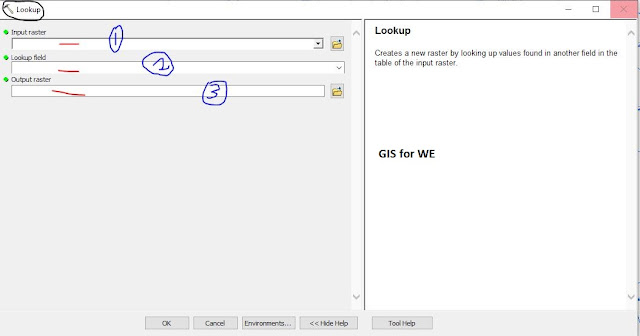Lookup, Reclass by ASCII File, Reclass by Table Tools
Lookup
How to use Lookup Tool in ArcToolbox ArcMap ArcGIS ??
 |
| Lookup Tool |
Lookup Tool, Raster Reclass Toolset, 3D Analyst Toolbox
Lookup
Creates a new raster by
looking up values found in another field in the table of the input raster.
1. Input raster
The input raster that
contains a field from which to create a new raster.
2. Lookup field
Field containing the
desired values for the new raster.
It can be a numeric or
string type.
3. Output raster
The output raster whose
values are determined by the specified field of the input raster.
Reclass by ASCII File
How
to use Reclass by ASCII File Tool in ArcToolbox ArcMap ArcGIS ??
 |
| Reclass by ASCII File |
Reclass by ASCII File Tool, Raster Reclass Toolset, 3D Analyst Toolbox
Reclass by ASCII File
Reclassifies (or
changes) the values of the input cells of a raster using an ASCII remap file.
1. Input raster
The input raster to be
reclassified.
2. Input ASCII remap file
ASCII remap file
defining the single values or ranges to be reclassified and the values they
will become.
Allowed extensions for
the ASCII remap files are .rmp, .txt, and .asc.
3. Output raster
The output reclassified
raster.
The output will always
be of integer type.
4. Change missing values to NoData (optional)
Denotes whether missing
values in the reclass file retain their value or get mapped to NoData.
·
Unchecked—Signifies that if any cell location on the input raster
contains a value that is not present or reclassed in the remap file, the value
should remain intact and be written for that location to the output raster.
This is the default.
·
Checked—Signifies that if any cell location on the input raster
contains a value that is not present or reclassed in the remap file, the value
will be reclassed to NoData for that location on the output raster.
Reclass by Table
How to use Reclass by Table Tool in ArcToolbox ArcMap ArcGIS ??
 |
| Reclass by Table |
Reclass by Table Tool, Raster Reclass Toolset, 3D Analyst Toolbox
Reclass by Table
Reclassifies (or
changes) the values of the input cells of a raster using a remap table.
1. Input raster
The input raster to be
reclassified.
2. Input remap table
Table holding fields
defining value ranges to be reclassified and the values they will become.
3. From value field
Field holding the
beginning value for each value range to be reclassified.
This is a numeric field
of the input remap table.
4. To value field
Field holding the ending
value for each value range to be reclassified.
This is a numeric field
of the input remap table.
5. Output value field
Field holding the
integer values to which each range should be changed.
This is an integer field
of the input remap table.
6. Output raster
The output reclassified
raster.
The output will always
be of integer type.
7. Change missing values to NoData (optional)
Denotes whether missing
values in the reclass table retain their value or get mapped to NoData.
·
Unchecked—Signifies that if any cell location on the input raster
contains a value not present or reclassed in a remap table, the value should
remain intact and be written for that location to the output raster. This is
the default.
· Checked—Signifies that if any cell location on the input raster contains a value not present or reclassed in a remap table, the value will be reclassed to NoData for that location on the output raster.

Comments
Post a Comment